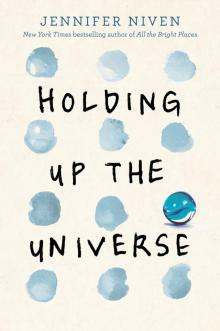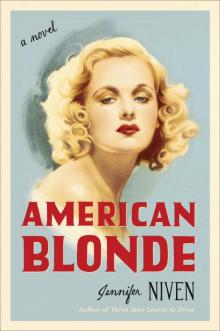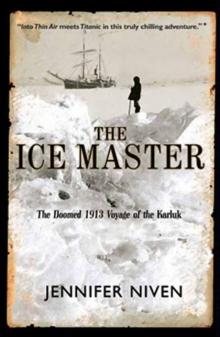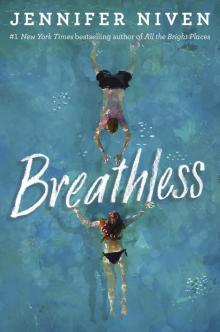- Home
- Jennifer Niven
Holding Up the Universe Page 7
Holding Up the Universe Read online
Page 7
The principal folds her hands on her desk. Her eyes are fixed on us like she’d turn us to stone, if only she could. “Fighting on school property is a serious charge. So is vandalism.” And it takes me a minute. She holds up a scan of a photograph, which I don’t need to look at because I already know what’s there. She says to Jack, “Do you know anything about this?”
He leans forward to study the picture. Sits back again, shaking his head. “No, ma’am, I do not.” Ma’am.
My dad leans in. “Let me see that, please.”
As he takes the piece of paper, Principal Wasserman says, “I’m afraid someone has defaced one of our school bathrooms with derogatory comments about your daughter. I assure you it is going to be dealt with. I don’t take something like this lightly either.” She looks at Jack again. His mom looks at him. My dad looks at him, his jaw tensing so much I’m worried it will crack in half.
I will myself to become invisible. I shut my eyes, as if this might help. When I open them again, I’m still in the chair and everyone is staring at me. I say, “Sorry?”
My dad waves the scan. “Do you know who did this?”
I want to say no. Absolutely not.
“Libbs?”
Here’s my choice—I can lie and say no. I can tell them Jack did it. Or I can tell the truth.
“Yes.”
“Yes, you know who did it?”
“Yes.”
Everyone waits.
“It was me.”
It takes them a minute.
The boy whistles.
His mom says, “Jack.”
“Sorry. But.” He whistles again.
Principal Wasserman’s face has fallen, and I can imagine her sitting down with her husband tonight, telling him how kids have changed, how we break her heart, how it’s a good thing she’s almost retired because she doesn’t know that she can do this much longer.
My dad says, “Why, Libby?”
And maybe it’s the way he says “Libby” instead of “Libbs,” but for some stupid reason, I’m about to cry. “Because someone was going to write it.”
And suddenly I feel naked, like I might as well be laid out on a dissecting table, insides exposed to the world. There’s no way I can ever explain to anyone other than my dad the importance of being prepared, of always being one step ahead of everyone and everything.
“Better to be the hunter than the hunted. Even if you’re hunting yourself.”
My eyes meet Jack’s. “Something like that.”
“And then I come along to prove your point.”
He holds my gaze for a few seconds, and then we both look away. We sit there, the five of us, in the most awkward silence of my life, until the principal says, “There are several different punishments I could give you. Suspension. Expulsion. In some cases, schools in Rushville and New Castle have even called in local police to make arrests.”
Jack goes, “How about we let my punishment be that the entire school saw a girl kick my ass.”
“Or we can prosecute you for bullying,” she says to him.
Jack’s mother, the attorney, nearly falls off her chair. “Before we talk about prosecuting—”
Principal Wasserman speaks over her. “And you, Libby, for fighting.”
“It was self-defense!” My voice booms out, too loud and high. “When I punched him, I mean.” Although the bathroom was about self-defense too.
The principal nods at Jack. “Had he let go of you by the time you hit him?”
“Only because I pulled him off me.”
She shakes her head and sighs for three days. “I’m not going to make my decision right now. I want to talk to witnesses. I need to look at your records, weigh the options. But I want to make it clear that I have a zero-tolerance policy when it comes to violence, bullying, or anything that even hints at sexual harassment.” She narrows her eyes at Jack, then at me. “I’m not too crazy about vandalism either.”
We’re told to wait outside Wasserman’s office. The security guard and the bearded teacher go in as we come out, along with a couple of kids, God knows who, maybe my own brother. Libby and I sit side by side on a bench. I watch the door leading out of here, into the main hall, and all I can think is Don’t let Monica Chapman walk in, not with my mom in there.
Libby looks at me. “Why did you do it?”
I want to say Read the letter, but right about now that letter seems like the second-worst idea I’ve ever had.
“Haven’t you ever done something mean or stupid without thinking it through? Something you instantly regretted as soon as you did it?” She doesn’t answer. So I say, “Sometimes people are just shitty. Sometimes they’re shitty because they’re afraid. Sometimes they choose to be shitty to others before others can be shitty to them. Like self-defensive shittiness.”
Because my brain is damaged. Because I’m damaged.
“Why me? Or should I ask?”
“You shouldn’t ask.” There’s no way in hell I’m saying the words “Fat Girl Rodeo” to her.
She rolls her eyes and looks away. “You don’t think they’ll suspend us. Or expel us?” She says this toward the other side of the room.
“No. This isn’t my first…” I almost say “rodeo” but stop myself. “We’ll be okay.” Although honestly, I’m not so sure.
Her eyes meet mine again and I smile at her, even as I’m hating myself, and my lip starts bleeding.
“Does it hurt?”
“Yeah.”
“Good.”
—
An hour or so later, the door to the principal’s office opens, and Principal Wasserman (short gray hair, glasses) waves us back in. Two men lean against the windowsill—one of them is a giant and the other is pretty skinny. Libby’s dad fixes me with a look. He is broad-shouldered, like Charles Bronson, and I feel the need to say, “I’m sorry, sir.”
Libby and I drop into our usual chairs. I catch my mom’s eye, and she shakes her head (she wears her hair one of two ways, and today she is Mom-with-Hair-Up). I may not be able to recognize faces, but I can tell when someone is disappointed and furious, and my mom is both. I think of all the times Mom has told me to stay out of trouble, that people will be harder on me because of the way I look. I know I’ve let her down, and she will say I’ve let myself down.
The gray-headed woman props her elbows on the desk and leans forward. “I’m not going to suspend you or expel you. Not this time. Instead the two of you will perform community service together, only instead of doing this for the community, it will be community-type service for the school. We’re putting you in charge of painting the bleachers and the locker rooms. Mr. Sweeney will supervise.” The giant nods at us.
“The two of you will also meet with a counselor every day after school for the next few weeks. The Conversation Circle is being used effectively at more and more schools across the country, and I believe it will also be effective here. It’s important that you learn from the experience and each other. Mr. Levine”—the skinny guy waves—“specializes in some of the most prevalent issues affecting teens today, including bullying, prejudice, and sexual harassment.”
I clear my throat, which still feels raw. “I don’t think it’s fair to punish her for something I instigated. I’d rather serve the time for both of us.”
Libby goes, “You are unbelievable.”
“What?”
“You don’t get to be the villain and the hero.”
Principal Wasserman says, “Thank you, Jack, but Libby broke the rules as well.”
—
As we leave, I try to say “I’m sorry” again, but Libby’s father wraps his arm around her shoulders and steers her away.
In the parking lot, my mom says, “We’ll discuss this at home, Jack Henry.” My full name. Something she hasn’t called me in years. She drives off without another word.
I go directly to Masselin’s, hoping to slink in and bypass everyone—namely my dad. I’m barely settled behind the office desk when he com
es walking in. “I heard what happened today. What the hell were you thinking?”
I tell him I don’t know, that it was meant to be a prank, but it ended up being a really stupid idea, and I wish I hadn’t done it, and all the other things I’ve spent the past few hours saying over and over.
“Your mother and I are disappointed in you.”
As if he needs to tell me this. I want to say I’m disappointed in you too. But instead I say, “I know. I’m sorry.”
When I’m finally alone, I turn on my phone. It immediately blows up with voicemails and texts. There’s Caroline, Seth, Bailey Bishop, Kam, and about a hundred other people, including Marcus, who know all about what happened.
Bailey Bishop is crying because she can’t believe I would do something so hurtful to another human being. Caroline talks mostly about herself, but my brother actually wants to know if I’m okay and what happened with the principal.
Kam’s message says, Congrats, princess. You win. Choose the place so we can take your sorry ass out for a victory meal. But hey, do me a favor and don’t get your ass kicked by any other girls before then. Followed by an entire minute of laughter.
The radio is playing, but the volume is low, and my dad is talking on and on. When he brings up homeschooling again, I say, “You don’t need to worry about me. I can take care of myself.”
“You really punched him?”
“Right in the mouth.”
And then he laughs.
“Are you laughing?”
“I think I am.”
“You’re not supposed to laugh. You’re supposed to tell me violence never solves anything and take away my phone or something.”
“Don’t punch anyone again. And if it makes you feel better, give me your phone.” And he just keeps on laughing.
And now I’m laughing too. And for the first time in a long time, I feel normal, weird as that sounds. We feel normal. Which makes me think what happened today wasn’t so bad after all, and maybe all the humiliation and the upcoming hours of community service and counseling are worth this single moment.
As we pull up to our house, Dad says, “Don’t let that boy get in your head. Don’t let him take away what you’ve worked so hard for.”
“I won’t. I’m getting up tomorrow and going back to school.” I look down at my shoes and the quote written there. “ ‘You can’t stop living.’ ”
I find Dusty in his room, playing video games. He’s got his headphones on, and I can hear the music blasting through them—the Jackson 5, which he only listens to when he’s feeling his absolute worst.
I wave at Dusty, and finally he looks up and mouths, “What?”
I mime removing headphones. I make it elaborate and exaggerated, hoping he’ll laugh. He ignores me.
I start to dance. Dusty can’t resist dancing. The song is “Rockin’ Robin,” and I don’t hold back. I just go for it. I’m twisting and grooving across the floor. I’m in a music video. I’m Michael Jackson in his prime. I am the man.
“I’m the man,” I say, loud enough so he can hear. I shake out the lion fro, making it as big as possible.
“You’re not the man.” He says it too loud, the way you always do when you’re listening to the Jackson 5 at full volume through headphones.
“I am the man.” I’m doing dance moves, ones he taught me. I purposely do them wrong because he won’t be able to help himself. He makes me sweat it for another thirty seconds, and then he’s up and the headphones are off and he starts showing me the correct steps.
We finish the song, dancing in unison, and it’s awesome, but then the song is over, and Dusty drops onto his bed and gives me this look that lets me know we’re only in unison on the dance floor, nowhere else.
Just to drive the point home, he goes, “You’re not the man.”
“I guess not.” I sit next to him and we both stare at the floor.
“So which is it? Which reason made you do this shitty thing?”
I think through all the reasons I listed before—Sometimes they’re just shitty people. Sometimes people have been shitty to them. Sometimes they’re shitty because they’re afraid. Sometimes they choose to be shitty to others before others can be shitty to them. Sometimes someone doesn’t like who he is, but then here’s this other kid who knows exactly who he is, and that can make that first kid feel even worse about himself.
“Maybe all of them. But I meant what I said. I’ll never be shitty to you.”
Then he looks at me, and he might as well knock me in my split lip because he goes, “You need to make it right.”
“I know.”
My dad finds me in the kitchen, eating standing up, and this is something we don’t do anymore. It’s one of the food rules we follow, along with don’t eat in front of the TV, don’t eat too fast, and stop eating when you’re sixty percent full.
When I see him, I set the plate down. Wherever the ache is coming from—my heart, my stomach—the food isn’t reaching it.
When my mom went away, I went empty too. Like all of me just flooded out and disappeared. In the hospital, I held her hand until my grandmother came in, and my dad, and the rest of my family. All of them sweet and loving and brokenhearted, but none of them like my mom. Not even all together. They didn’t begin to add up to her.
My dad’s eyes go to the plate, but he doesn’t comment. Instead he says, “Bailey Bishop is here to see you.”
—
Bailey stands in the center of my bedroom, head turning, hair catching the light like it’s trying to grab all of it and keep it for itself.
“It’s been a long time.” She leans down to rub George under his chin, and surprisingly he lets her. Traitor, I think. Bailey says, “Didn’t you have him back then?”
“I got him when I was eight.” My mom and I picked him out, or rather he picked us. We went to a rescue event, and George got free of his cage and packed himself into my mom’s purse. “He was supposed to die four years ago, but he’s not ready.”
The last time Bailey was at my house, we were ten. I had invited her and Monique Benton and Jesselle Villegas for a sleepover. The four of us stayed up all night and talked about boys and told each other our deepest, darkest secrets. Bailey’s was that she tried to give her baby brother away when he was born. Mine was that I sometimes spied on the boys who lived across the street. This was before Dean, Sam, and Castiel became my only friends.
Bailey straightens and focuses all of her Bailey-ness on me and says, “I’m sorry I never came to see you. I should have come to see you. When you were in here. Well, not in here, but in your old house.”
This throws me completely, and I stand there like a lump. How does she get to be so nice and also have hair like that? Finally, I go, “That’s okay. I mean we weren’t best friends or anything.”
“But we were friends. I should have come.”
Should I hug her? Should I tell her it’s okay? Should I tell her she should have come to see me a long time ago, way before I was trapped in my house, when my dad first pulled me out of school and let me stay home?
She says, “I have to tell you something, and it’s horrible, but I don’t want you to have to hear about it at school.” All of a sudden, she looks like she’s going to cry, and at first I think she’s going to tell me she’s dying or maybe I’m dying.
And then she tells me about the game. How I was the grand prize in something called Fat Girl Rodeo, and how that news has spread across social media like a virus. Everyone is infected, and my two thousand classmates and many, many strangers are all weighing in (get it?) about whether they’re Team Libby or Team Jack.
Someone’s posted a picture of me, which they must have snapped just after it happened, because there I am in the cafeteria, looking mad as a hatter, fist still clenched, Jack Masselin sprawled at my feet. You can’t see his face, but you can see mine (dangerously red, slightly sweaty). Caption: Don’t mess with Mad Lbs. “Lbs” as in pounds, of course. There are seventy-six comments, and only
a few of them are nice. The rest say the usual: If I was that big, I’d want to kill myself. And: She’s pretty for a fat girl. And: Just looking at her makes me want to never eat again. And simply: LOSE WEIGHT, YOU FAT WHORE.
This is exactly why I don’t do social media. So many mean comments and snarky comments and bullying disguised as I’m only expressing my opinion, as the Constitution of our great country requires me to do. If you don’t like it, don’t read it. Blah blah blah.
I have this overwhelming urge to throw Bailey’s phone away and my phone away, and then go up and down the street collecting phones so I can throw them away too.
Bailey says, “Maybe I shouldn’t have said anything.” She chews on a fingernail and squints up her eyes, and I can see the tears in them.
“I’m glad you did.” I mean I’m not happy, obviously, but I was going to find out somehow and being told by the world’s kindest person is probably the best way to do that.
I turn my phone off, and then I shut down the computer so I can’t read about myself anymore. I say to Bailey, “I am sick of reading about myself.” She nods in her eager-to-please Bailey way. I start pacing, which means I’m about to start talking. A lot. “For one thing, there’s only so much new material you can get from the fact that I’m overweight. We get it, people. Move on.”
Bailey nods like crazy. “We get it.”
“And this whole ‘pretty for a fat girl’ thing. I mean, what is that? Why can’t I just be pretty period? I wouldn’t say, ‘Oh, Bailey Bishop, she’s pretty for a skinny girl.’ I mean, you’re just Bailey. And you’re pretty.”
“Thank you. You’re pretty too.” And unlike Caroline and Kendra, I know she means it.
“And what is this whole ‘fat girl equals whore’ bullshit?” She flinches. “Sorry. ‘Fat girl equals whore’ garbage. What is that? Why am I automatically a whore? How does that even make sense?”
“It doesn’t.”
“If everyone who had something to say about me spent as much time on, I don’t know, practicing kindness or developing a personality or a soul, imagine how lovely the world would be.”

 Ada Blackjack: A True Story of Survival in the Arctic
Ada Blackjack: A True Story of Survival in the Arctic The Aqua Net Diaries: Big Hair, Big Dreams, Small Town
The Aqua Net Diaries: Big Hair, Big Dreams, Small Town Holding Up the Universe
Holding Up the Universe American Blonde
American Blonde All the Bright Places
All the Bright Places Velva Jean Learns to Fly
Velva Jean Learns to Fly The Ice Master
The Ice Master Breathless
Breathless The Aqua Net Diaries
The Aqua Net Diaries Becoming Clementine: A Novel
Becoming Clementine: A Novel